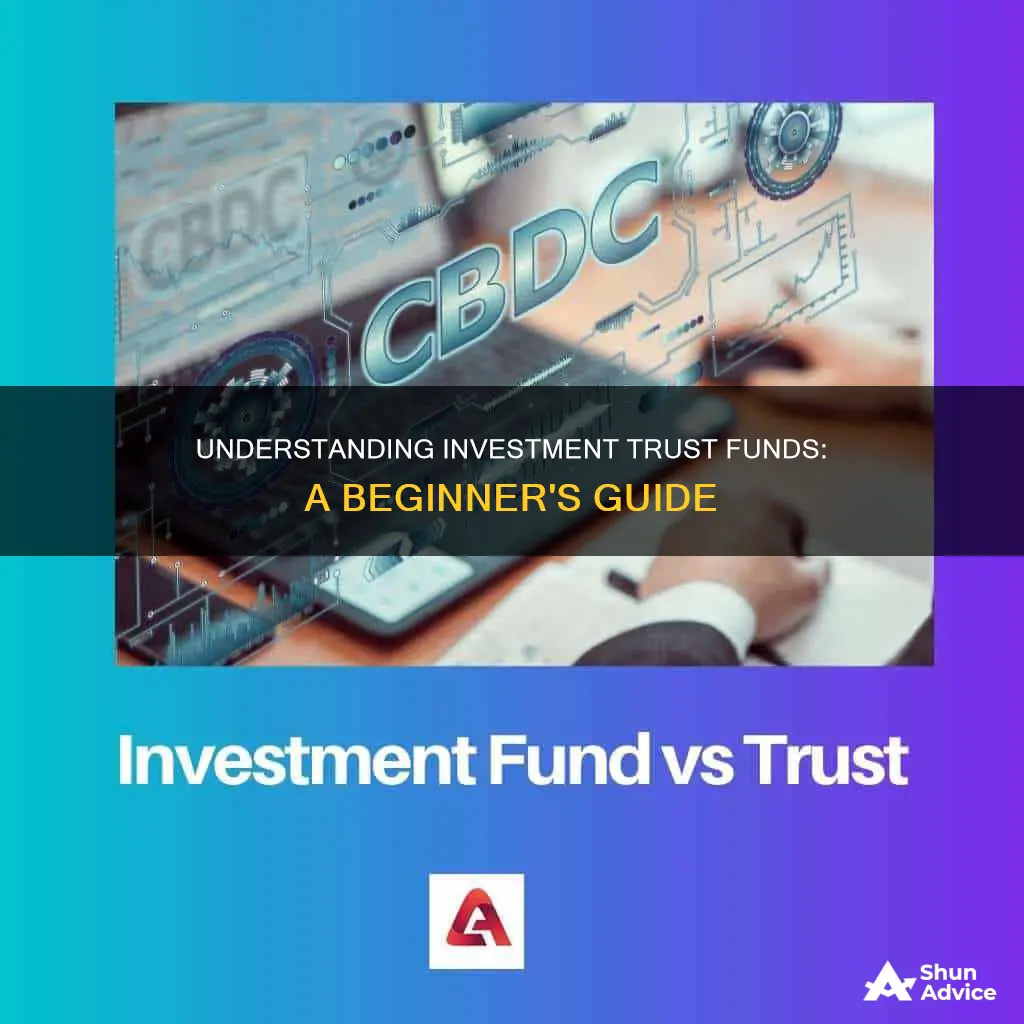
Investment trust funds are financial entities that pool money from investors or shareholders to invest in a variety of assets, including stocks, bonds, real estate, and other companies' shares. They are typically structured as public limited companies, issuing a fixed number of shares and are known as closed-ended funds. This structure allows investment trusts to take a long-term view, borrow money, and pursue higher returns. The main benefit of investing in these trusts is diversification, which reduces risk by spreading investments across multiple assets. While investment trusts aim to generate profits, there is inherent risk due to their reliance on market performance and the fund manager's decisions. The returns depend on the performance of the underlying assets, and investors need to be aware of the associated challenges and risks, such as liquidity and gearing risks. Investment trusts are most common in the United Kingdom and Japan, with the first one established in 1868.
What You'll Learn
- Investment trusts are a form of investment fund found mostly in the UK and Japan
- They are constituted as public limited companies and are therefore closed-ended
- Investment trusts can hold a variety of assets, from listed equities to real estate
- They are the best option for investors looking for profits with minimal risk
- Investment trusts are run by an independent board of directors, who monitor performance and shareholder interests

Investment trusts are a form of investment fund found mostly in the UK and Japan
Investment trusts are a form of investment fund found predominantly in the UK and Japan. They are constituted as public limited companies and are therefore closed-ended as fund managers cannot redeem or create shares.
The first investment trust was the Foreign & Colonial Investment Trust, which started in 1868 with the aim of "giving the investor of moderate means the same advantages as large capitalists by spreading investment across numerous stocks to reduce risk".
In the UK, the term "investment trust" has a strict meaning under tax law, but it is also used more generally to refer to any closed-ended investment company, including venture capital trusts (VCTs). These trusts can hold a variety of assets, including listed equities, government or corporate bonds, real estate, and private companies.
Similarly, in Japan, investment trusts, called trust accounts, are a popular investment vehicle. The largest stockholder of many public companies in Japan are trust banks that handle these investment trusts.
Investment trusts pool money from investors or shareholders and invest in diversified portfolios on their behalf. They offer a limited number of shares for trade, based on market demand and supply. By investing in these trusts, individuals and entities can maintain a balanced investor profile, minimising risk by diversifying their investments across multiple shares or assets.
While investment trusts can provide stable returns and reduced risk, their performance is tied to the market. Therefore, the fund manager's ability to gauge market conditions and make timely decisions is crucial to the trust's success.
TSP G Fund: A Guide to Investing
You may want to see also

They are constituted as public limited companies and are therefore closed-ended
Investment trusts are constituted as public limited companies, and as such, they are considered 'closed-ended'. This means that fund managers cannot redeem or create shares.
Being a public limited company means that the investment trust is incorporated under company law and has a fixed capital structure. The term 'investment trust' is a relic from when these vehicles were constituted as trusts. However, they are no longer considered trusts in the legal sense, and all such vehicles have since converted to limited companies.
As limited companies, investment trusts are subject to Corporation Tax. However, those approved by HMRC are exempt from Corporation Tax on their capital gains.
Investment trusts are a type of collective investment vehicle. They pool investors' money to invest in a broad range of shares, securities, and other assets, aiming to provide income, capital growth, or a combination of both for their investors.
The first investment trust was the Foreign & Colonial Investment Trust, founded in 1868. It aimed to "give the investor of moderate means the same advantages as the large capitalists in diminishing the risk by spreading the investment over a number of stocks".
DSP Blackrock Tax Saver Fund: A Smart Investment Strategy
You may want to see also

Investment trusts can hold a variety of assets, from listed equities to real estate
Investment trusts are a form of investment fund that pools investors' money to invest in a variety of assets. They are commonly found in the United Kingdom and Japan, where they are constituted as public limited companies.
Investment trusts can hold a diverse range of assets, including listed equities, government or corporate bonds, real estate, and private companies. These assets can be located anywhere in the world.
One of the most well-known types of investment trusts is real estate investment trusts (REITs). These trusts invest in commercial or residential real estate and collect rents, providing a steady stream of income for investors. REITs are required to distribute a significant portion of their income, typically 90%, to their investors.
In addition to REITs, investment trusts can also hold listed equities, allowing investors to gain exposure to a diverse range of companies and industries. They can also invest in government or corporate bonds, providing a source of fixed income.
Furthermore, investment trusts can hold assets such as private companies, infrastructure projects, and specialist debt. The variety of assets held by investment trusts provides investors with a well-diversified portfolio, reducing the overall risk of their investments.
The ability of investment trusts to hold a wide range of assets makes them a versatile investment option, allowing investors to access various sectors and markets through a single investment vehicle.
Index Funds: Is Cheaper Always Better?
You may want to see also

They are the best option for investors looking for profits with minimal risk
Investment trust funds are financial entities that pool money from investors or shareholders and invest in a variety of portfolios on their behalf. They are closed-end funds that issue a fixed number of shares at launch and are traded on stock exchanges.
They are an excellent option for investors seeking profits with minimal risk for several reasons. Firstly, they provide diversification, allowing investors to invest in many shares across different companies and industries, rather than putting all their money into a single company's shares. This reduces the risk of loss as a poor performance in one share can be offset by gains in others.
Secondly, investment trust funds are managed by professional fund managers who are skilled at gauging market conditions and making timely investment decisions. These fund managers are overseen by an independent board of directors elected by shareholders, ensuring that the fund's performance is closely monitored and aligned with shareholder interests.
Thirdly, investment trust funds can borrow money or gear, which allows for greater exposure to stock markets and the potential for higher returns. This ability to gear also means that investment trust funds can maintain stable dividend payouts during challenging market periods.
Additionally, investment trust funds offer flexibility in terms of the types of assets they can invest in, including listed equities, government/corporate bonds, real estate, and private companies. This flexibility provides further risk mitigation as the funds are not solely dependent on the performance of a single type of asset.
Lastly, investment trust funds are structured as public limited companies, which means they have a separate legal identity from their investors. This structure provides protection for investors as the fund's liabilities do not extend to its shareholders.
In summary, investment trust funds are an attractive option for investors seeking profits while minimising risk. They achieve this through diversification, professional management, the ability to gear, flexibility in asset allocation, and a legal structure that protects investors.
Retirement Planning: Gold Fund or 401k?
You may want to see also

Investment trusts are run by an independent board of directors, who monitor performance and shareholder interests
Investment trusts are run by an independent board of directors, who are elected by shareholders. The board's role is to monitor the performance of the company and protect shareholder interests. They are responsible for overseeing the trust and ensuring it is fulfilling its purpose. This includes holding portfolio managers to account and reporting to shareholders.
The board of directors will typically appoint a professional fund manager to manage the company's investments. The fund manager, or 'portfolio manager', is responsible for investing the money on behalf of the trust. They choose which shares and other assets to buy and sell, working to a clear set of rules.
The board of directors of an investment trust is independent in that it is separate from the fund manager. The fund manager is responsible for the day-to-day management of the trust's investments, while the board of directors oversees the trust's overall performance and strategy. The board of directors also has a fiduciary duty to act in the best interests of the shareholders.
The independent board of directors is one of the key features that distinguish investment trusts from other types of investment funds, such as unit trusts. Investment trusts are run as public limited companies, with a fixed number of shares issued at launch, while unit trusts are open-ended funds that can continue to issue new units. As a result, investment trusts are able to take a longer-term view and borrow money to increase their exposure to stock markets, potentially leading to higher returns.
Mutual Funds: Smart Investment or Risky Business?
You may want to see also
Frequently asked questions
An investment trust fund is a financial entity that pools money from investors to purchase a diverse range of products, including shares, bonds, and other financial assets. The fund is managed by a professional fund manager who invests the pooled money in different portfolios on the investors' behalf.
Investment trust funds work by issuing a fixed number of shares at launch, making them closed-ended funds. The fund managers invest in a variety of assets to create a diversified portfolio, aiming to reduce risk and provide stable returns. The performance of the fund depends on the market and the fund manager's decisions.
Investing in an investment trust fund offers several benefits. It provides investors with access to a diversified portfolio, reducing the risk associated with investing in a single company's shares. The fund can also borrow money to increase its exposure to the stock market, potentially enhancing returns. Additionally, investment trust funds can provide consistent dividend payouts and offer the opportunity to invest in less liquid assets.
While investment trust funds offer the potential for high returns, there are also risks involved. The performance of the fund depends on the market and the fund manager's decisions. Poor market conditions or incorrect decisions by the fund manager can lead to losses. Additionally, the value of the fund's shares may trade at a discount or premium to the underlying value of its assets, affecting the overall value of the investment.







